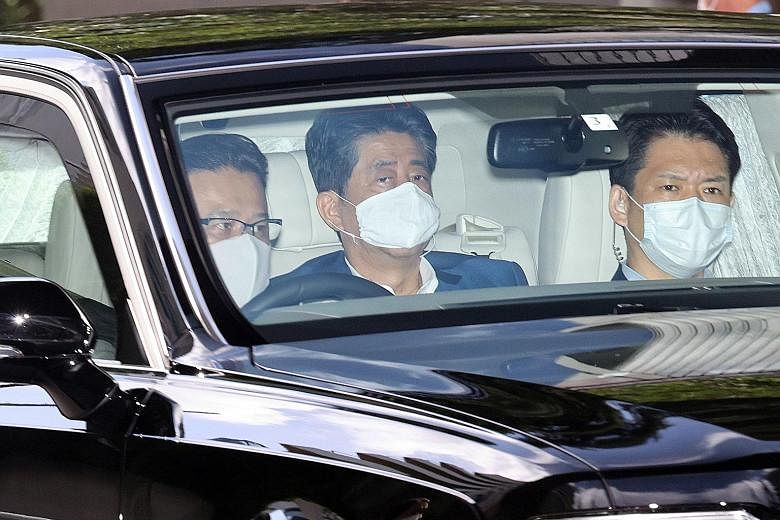TOKYO • Japan's Prime Minister Shinzo Abe yesterday said he wants to take care of his health and do his utmost at his job, after a second hospital visit within days sparked concern over whether he could stay on as leader of the world's third-biggest economy.
The visit came as Japan's longest-serving prime minister surpassed the record for longest consecutive tenure as premier - 2,798 days - set by his great-uncle Eisaku Sato half a century ago, adding to speculation Mr Abe could resign after reaching the milestone.
Mr Abe hit 2,799 days yesterday.
Criticised for his handling of the coronavirus outbreak and some scandals, Mr Abe, 66, has suffered a slide in voter support to one of the lowest levels since returning to office for a second term in 2012.
"I'd like to take care of my health and do my best at my job," Mr Abe told reporters at his official residence, after visiting a Tokyo hospital where he said he had received results of an exam done last week and undergone additional examination.
It was the same hospital where he was treated after his resignation from his previous stint as prime minister in 2007 for ulcerative colitis, a disease he now keeps in check with medicine that was not previously available.
Japanese media has speculated about Mr Abe's health this month, including detailed reports on his walking speed.
When asked whether Mr Abe would serve out his full term through September next year, government spokesman Yoshihide Suga said: "The additional tests are being done to achieve that end."
If Mr Abe is incapacitated, Deputy Prime Minister Taro Aso, 79, who doubles as finance minister, would take over temporarily as acting prime minister.
Those tipped as possible successors include Mr Aso, former defence minister Shigeru Ishiba, former foreign minister Fumio Kishida, Mr Suga, and Defence Minister Taro Kono.
Analysts have noted that these veterans are unlikely to make huge policy shifts.
But any successor may find it tough to emulate Mr Abe's political longevity, which followed years of revolving-door premiers and was aided by the strong economy, tight control over bureaucrats and weak opposition parties.
REUTERS, AGENCE FRANCE-PRESSE

